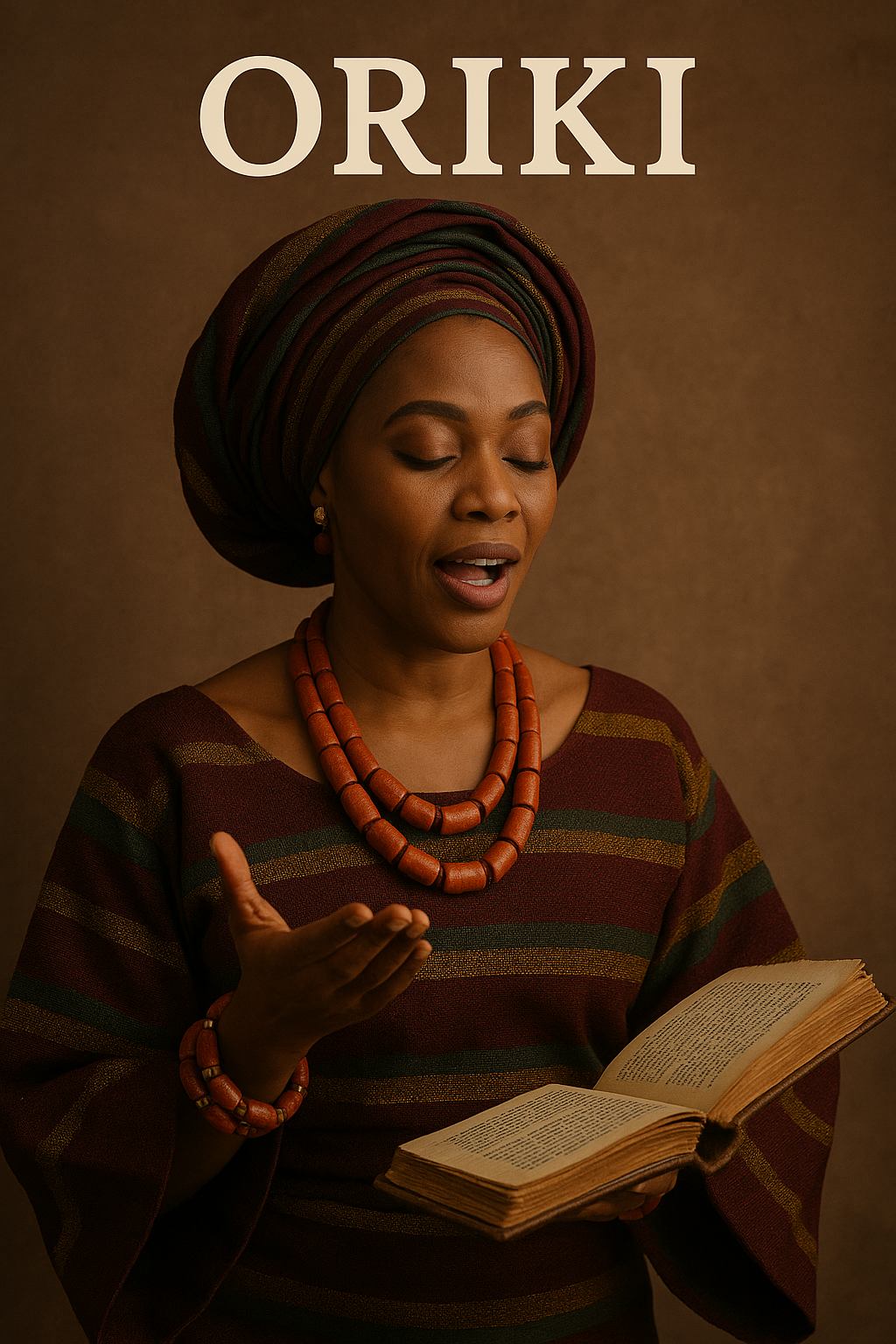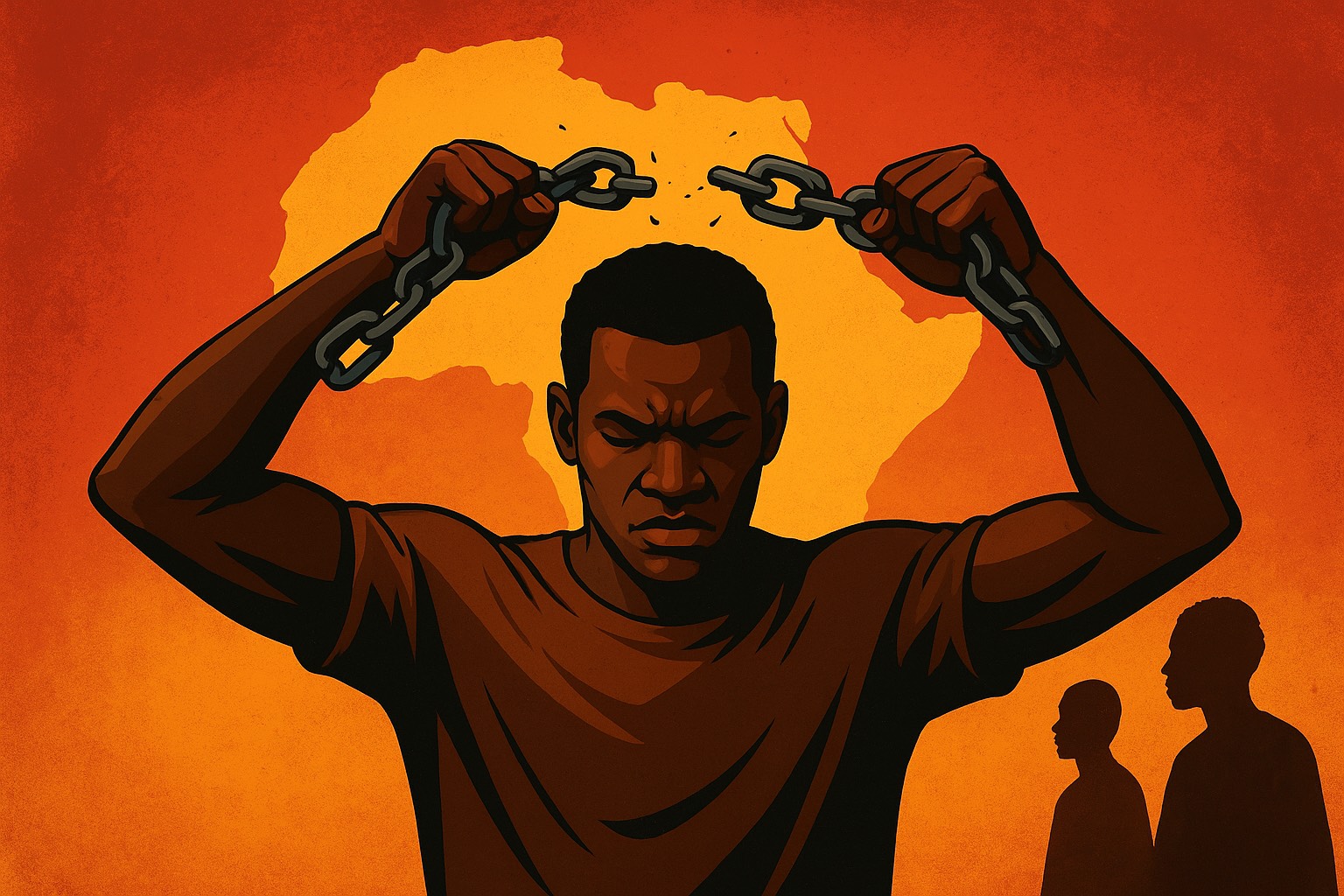Oríkì: The Soul of Yoruba Identity and Praise

Oríkì: The Soul of Yoruba Identity and Praise
Discover the essence of Oríkì, the Yoruba tradition of praise poetry that celebrates identity, ancestry, and cultural pride through powerful spoken word.
Oríkì (pronounced oh-ree-kee) is a profound and poetic Yoruba tradition used to praise, honor, and invoke the spiritual essence of a person, family, or place. Far more than just flattery, Oríkì reflects one's lineage, achievements, strengths, and ancestral roots. It is a living archive of Yoruba heritage, recited at ceremonies, whispered by elders, or sung by griots to ignite memory, identity, and pride.
This blog post explores Oríkì as a cultural tool and artistic expression, with real-life examples from Egba, Ota, and Oyo traditions.
What is Oríkì?
In Yoruba culture, Oríkì means “praise name” or “attributive appellation.” It often comes in the form of poetic lines that describe a person or place’s characteristics, history, and spiritual essence. Oríkì can be inherited or newly composed and is believed to invoke inner strength, honor ancestors, and even protect from spiritual harm.
Types of Oríkì
Oríkì is a multi-faceted tradition, with different categories reflecting various aspects of Yoruba life:
- Oríkì Ìdílé – Praise for families or lineages, often capturing the accomplishments and attributes of ancestors.
- Oríkì Òrìṣà – Praise songs for Yoruba deities, rich in metaphors and mythological references.
- Oríkì Ìlú – Praise poetry for towns or regions, celebrating their uniqueness and origins.
- Oríkì Akínkanjú – For warriors or leaders, highlighting bravery, strategic wisdom, and historical deeds.
- Oríkì Orúkọ Amútọ̀runwá – Names given based on birth circumstances, such as twins (Táyé and Kẹ́hìndé) or breech births (Ìgè).
- Oríkì Ọba àti Ìjọyé – Praise for kings and chiefs, often accompanied by traditional drumming.
- Oríkì Ounjẹ – Dedicated to foods, such as yams or potatoes, symbolizing abundance and cultural value.
- Oríkì Ẹranko – Given to animals, especially in the context of hunting traditions.
Each form carries spiritual, social, and historical significance, echoing the Yoruba belief that everything living or non-living has a divine essence worthy of acknowledgment.
Examples of Oríkì and Their Meanings
1. Egba Oríkì
Yoruba Version
Egba omo Lisabi
Omo olofin sa bi ewe
Omo ajibogun Olumo
Omo a f’oko gb’ogun, a fi ija s’oro
Egba ko l’olu, gbogbo nwon ni nse bi Oba
Omo a fi ina s’oko
Omo a gbe Ogun lo’ko, a fi Ija se’be
Omo a ko’gun roko, bi o f’eru ba bo
Omo a f’ewure s’ebo, ko s’ebi to le je
Omo a fi akisa gbe’kun, bi o ba sunkun
Omo Erin jogun ode
Omo a f’oko gbo’ro
Abeokuta ilu a f’oko se’be
Omo a j’ogun Olumo
English Translation
Egba, descendants of Lisabi,
Children of royalty, fresh like leaves.
Children of warriors under Olumo Rock,
Turning tools to weapons, strife into survival.
Egba have no king — they all behave like kings.
They set fire to their farms but flourish still.
Offering goats, lacking nothing.
They dry tears with rags if ever they weep.
Children who inherited hunting from elephants.
Abeokuta — the city that cooks with farming tools.
Proud heirs of the Olumo Rock.
2. Ota Oríkì
Yoruba Version
Ota omo Iyan-Gbẹdẹ
Omo Olota ilẹ Iyan
Omo a j’iyan, a f’ọbẹ jọ̀kọ́
Ota omo a fi ilé ta, ka gbọ ogun
Omo a f'ọba mefa se ọba kan
Ilu a kọ́bẹ si, ká má bà á jẹ
Ọta omo a fi oju han erin
Omo a gbe igi gun 'gbo, ká má já
Ọta, ilẹ àwòrán jẹjẹ
Ilu a bọ̀ wọ̀ àgbo, tí kò gbọ àkúnya
Ota, ọmọ ayédẹrun
English Translation
Ota, child of pounded yam and vegetable soup,
Royal children from the land of the Olota.
They eat in grace and prepare for war with wisdom.
A town ruled by six kings united as one.
They approach elephants without fear.
They walk through herds unnoticed, in peace.
Ota, land of gentle beauty and ease.
3. Oyo Oríkì
Yoruba Version
Ọ̀yọ́ ilé Ààfin
Ilé ọba tó yọ ata
Ilé àkọ́ni, kì í mọ̀ ṣèèjẹ
Ilé ọlọ́lá tó gbà mí
Ọ̀yọ́ ají-ṣẹ̀bí-Olú
Ilé akọ, ọmọ ogun
Ilé tí wọ́n fi jà l'ogun Kírìjì
Ilé Ọba tó kọ orílẹ̀-èdè
Ọ̀yọ́, ọmọ a kó ṣọ̀ọ̀ṣì, a kó mọlé
Ọ̀yọ́ Ajaka tó mọ ogun
Ọ̀yọ́ mo gbọ̀n, mo yà
Ọ̀yọ́ mo sà, mo segi
Ọ̀yọ́ ọmọ a gb’ẹ̀mi l'ọ́run
Ọmọ a fi agbára b’ogun
Ọ̀yọ́, ọmọ tí Sàngó fi dá ilé
Ọmọ Káàbọ̀-ọ̀run
English Translation
Oyo, land of the palace,
The royal house that sprinkles pepper — a sign of might.
Home of fearless warriors, heirs of dignity.
Oyo rises with the pride of kings.
Founded by Sango, bold and just.
Land of strategy and resilience.
Where tradition meets the divine.
The Significance of Oríkì Today
In modern times, Oríkì continues to evolve, used in music, fashion branding, and even social media to express identity. It’s common to see Yoruba youth proudly recite their Oríkì during birthdays or share digital versions online.
It connects Yoruba people globally to their roots, reinforcing self-awareness and cultural belonging in an increasingly globalized world.


